Blood in the EV Supply Chain
A look along the electric-vehicle supply chain reveals environmental and human exploitation at every stage.
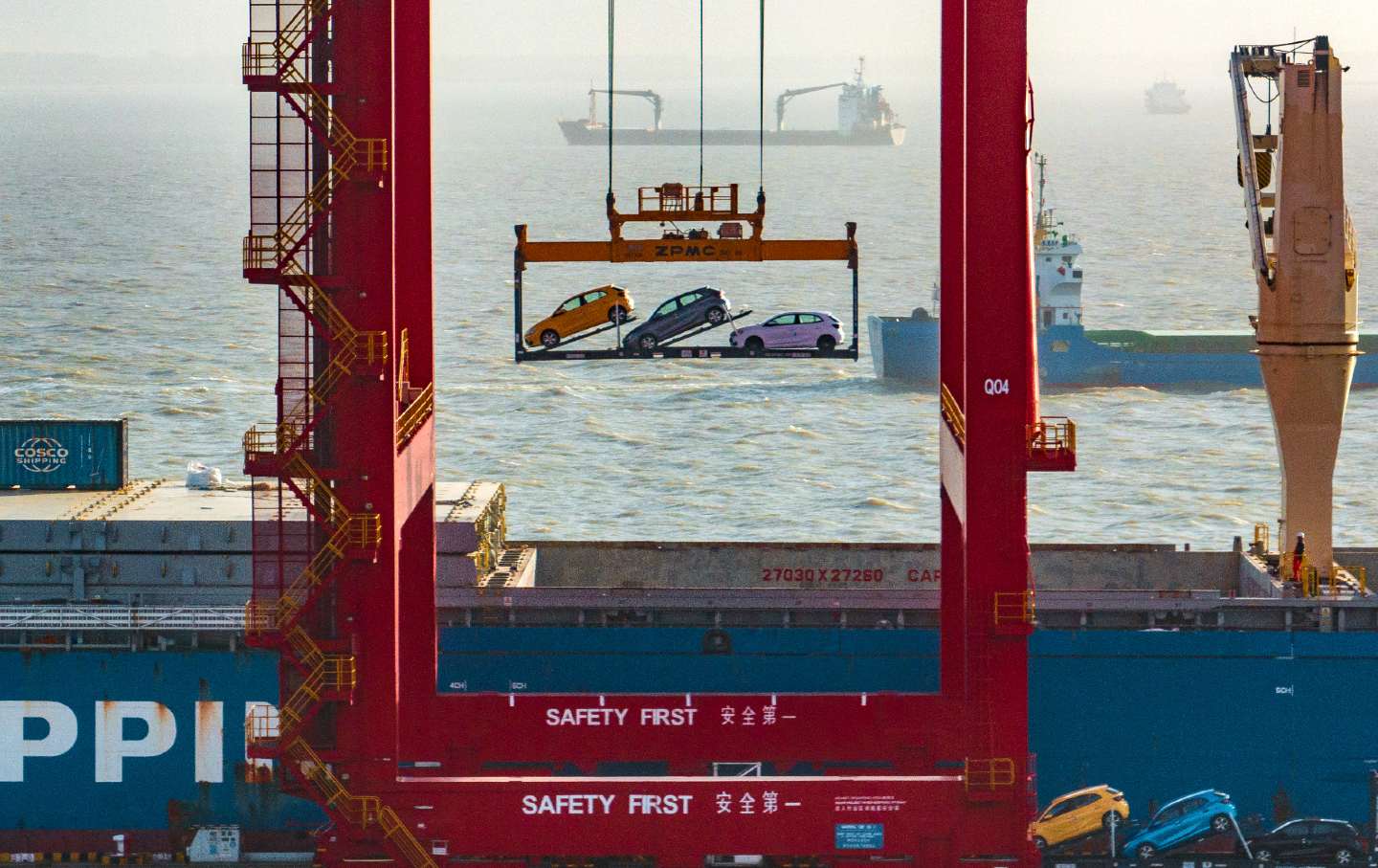
The growth of the electric vehicle industry is accelerating. Between 2023 and 2029, global sales are expected to more than double. But when these cars roll off assembly lines, they emerge out of a supply chain rife with exploitative, often brutal industrial practices. We need a decarbonized auto industry if we are to have a sustainable future, but the production of electric vehicles is still causing massive environmental and social damage in both the Global South and the United States.
Greenwashed Nickel
A typical lithium-ion battery system in a Tesla contains about 50 kilograms of nickel. As demand for the ore soars, mining companies are expanding their control of regions rich in nickel reserves—particularly in Indonesia, Australia, and Brazil—often in partnership with governments. But the breakneck extraction of nickel in the Global South is ravaging communities and Indigenous lifeways.
On the Philippine island of Pala’wan, the Rio Tuba Nickel Mining Corporation, a Filipino-Japanese joint venture, is feeding a nickel rush that now constitutes nearly half of the Philippines’ metallic mineral production. Processed nickel from Coral Bay is sent to Japan to be converted into cathode material for lithium-ion batteries, channeled into the battery plants of companies like Panasonic, and then shipped to carmakers like Tesla.
The mining threatens the ancestral habitat of Pala’wan’s Indigenous communities. Investigations by environmental groups have linked chronic environmental and public health issues in the area to open-pit nickel mining, including “loss of food security and the destruction of surrounding rainforests,” according to Business and Human Rights Resource Centre (BHRRC). Residents have reportedly been afflicted by respiratory problems and skin lesions that may be linked to water contamination. Water-quality tests conducted by Friends of the Earth Japan from 2009 to 2019 found elevated levels of Hexavalent chromium, a known carcinogen associated with kidney damage and liver cancer.
When BHRRC researchers presented evidence of contamination to Rio Tuba and Sumitomo Metal Mining (the Japanese corporation that partially owns Rio Tuba’s parent company Nickel Asia), both stated that they had adequate environmental safeguards in place and that their own environmental and health monitoring of the area had found no significant damage linked to their operations.
But BHRRC’s report criticized the industry’s practices as “negligent at best. At worst, it is active participation in ‘greenwashing,’” referring to corporate charity or “social responsibility” programs that seek to paper over destructive industrial practices. In places like Pala’wan, initiatives such as Rio Tuba’s reforestation program purport to offset the social and environmental impacts of corporate extraction by supporting ecological rehabilitation projects or the development needs of local communities.
Indigenous leaders have launched legal challenges claiming that mining companies’ memorandums of understanding with local community representatives have circumvented Indigenous land rights and decision-making processes.
Last September, in a case brought by Pala’wan Indigenous community members against Ipilan Nickel Corporation (INC), the Philippines Supreme Court ordered government agencies to address the communities’ claims that the company illegally cut trees and continued mining operations in the area without properly obtaining informed consent from local communities. The court underscored the “possibility of serious and irreversible harm on the environment and the inhabitants” of a site known as Brooke’s Point in the Mount Mantalingahan Protected Landscape, which Indigenous communities hold sacred. (In response, INC denied it had violated consent policies and touted the company’s employment of Indigenous workers and charity programs intended “to uplift the indigenous community.”)
In a recent report on the social impact of mining “transition minerals” (including nickel, lithium, cobalt, and copper), BHRRC found that globally, Indigenous groups “disproportionately bear the brunt of the harmful impacts of transition mineral mining.” The group tracked more than 60 cases of Indigenous peoples’ rights being breached by mining interests from 2010 to 2023, including dozens involving “their right to free, prior, and informed consent” for mining operations in their area.
BHRRC researcher Pochoy Labong told me that, in the global transition to greener cars, “These are age-old quote-unquote “sins” of the extractive industry. It’s just a new set of buyers that are buying these products.”
“A Lot of Blood”
As with the Philippines, Indonesia has recently supercharged its nickel-mining operations. The government has launched an aggressive development agenda centered on expanding the country’s nickel-processing capacity, driven by Chinese investment in plants that produce higher-grade nickel with relatively low labor and overhead costs. But environmental justice groups say the nickel feeding frenzy is ravaging the waterways, forests, and rice fields near industrial facilities, and mining companies have partnered with local authorities to terrorize and silence local opposition.
In 2017 and 2018, according to the environmental justice group JATAM, a company owned by the Indonesian conglomerate Harita Group displaced residents of the Kawasi Village to clear land for nickel mining and smelting operations. Instead of following protocols for consultation with affected residents, the company “deployed village and sub-district staff and local police officers to intimidate and force residents to sign on the compensation process” under threat of imprisonment. Villagers who once farmed their own land had no choice but to become laborers for the mines.
In a fishing village in Bahodopi district, a 2022 report by Nikkei Asia documented that once-abundant supplies of fish had dwindled due to “hot wastewater” flowing from the nearby Indonesia Morowali Industrial Park in Central Sulawesi. In addition, soot from the coal used to power the processing plants had reportedly caused respiratory issues among the villagers.
Popular
“swipe left below to view more authors”Swipe →In Southeast Sulawesi, residents have charged that a mining project run by the nickel and coal corporation PT Wijaya Inti Nusantara has wrought similar environmental and social devastation. Ayunia Muis, an environmental activist based in Torobulu village, told me through an interpreter, “There is a lot of blood of villagers around mining activities, because they take away the source of our living.”
Noting the connections between the mining industry and Indonesia’s political elite, she said, “All of the money or the advantages… from these nickel mining activities—the businessmen will get it, the companies will get it, the police will get it, the military will get it. But the citizens of will pay the cost.”
Cobalt mining in the Democratic Republic of Congo is causing a similar environmental and societal damage. In 2021, researchers with the UK-based Rights and Accountability in Development (RAID) and the DRC-based Centre d’Aide Juridico-Judiciaire (CAJJ) tracked not only highly exploitative labor conditions in DRC cobalt mining operations but also widespread abuse and discrimination from managers of Chinese mining companies and their subcontractors.
Workers reported “being kicked, slapped, beaten with sticks, insulted, shouted at, or pulled around by their ears” when management disciplined them over mistakes, not understanding instructions in Chinese, or just refusing to undertake what they perceived as dangerous tasks. One interviewee told researchers, “If you didn’t understand what the boss said to you, he would slap you in the face. If you had an accident, they would just fire you.”
Medical personnel described widespread chronic health issues among mine workers, including high rates of silicosis and asbestosis. In Kolwezi, a major cobalt-producing region in southeastern DRC, surveys published last March by RAID and AFREWATCH indicated that more than half of respondents reported reproductive health problems for women, such as miscarriage, associated with cobalt mining. Ninety-nine percent of people reported that local crop yields were “dramatically reduced due to water contamination.”
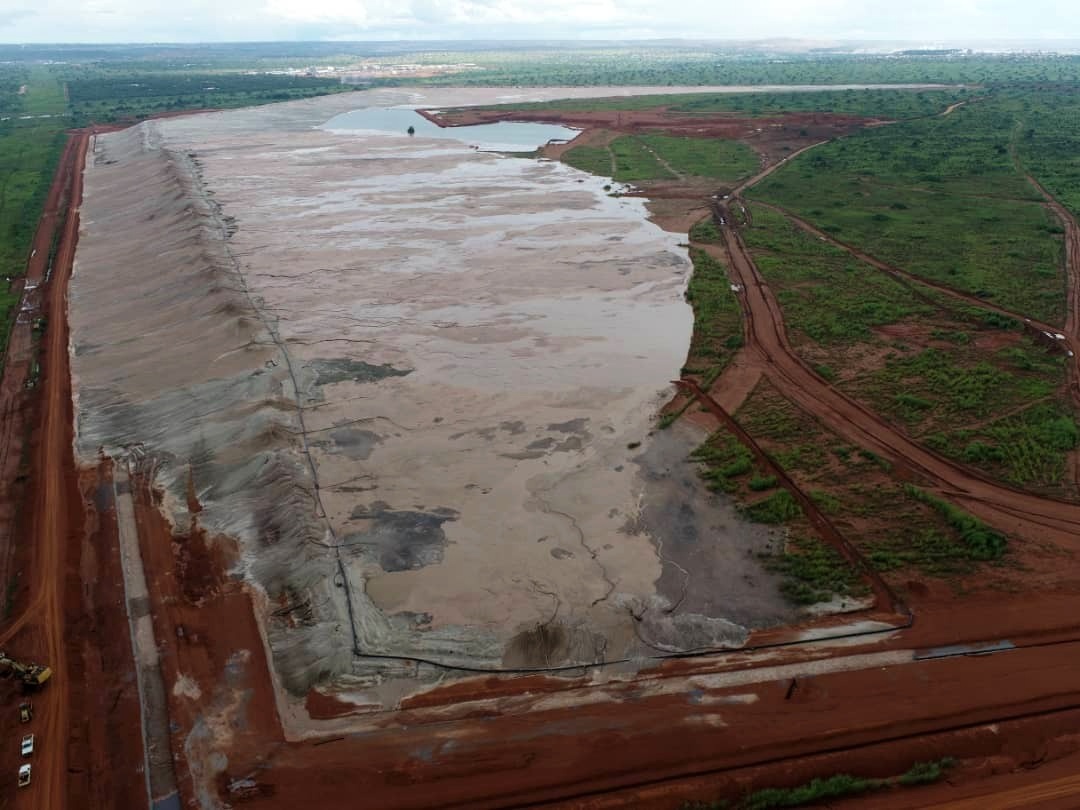
Some mining firms are reportedly precipitating mass displacement. In the Kolwezi region, for example, Amnesty International and a DRC-based organization, the Initiative pour la Bonne Gouvernance et les Droits Humains, documented stories of soldiers evicting residents of the village of Mukumbi in 2016. After representatives from the Dubai-based mining corporation Chemaf visited the village and ordered them to move, according to the local chief, members of an elite military force arrived one morning, began burning down the settlement “and beat villagers who tried to stop them.” Satellite images analyzed by Amnesty indicate that hundreds of structures in the area were wiped out during that time.
“People were scattered,” one villager named Mama Florence recalled, “and we sometimes went to unwanted places, like refugees. From 2016 to 2019—we suffered for three years. Some spent nights in churches, and others in schools.”
In a letter to Amnesty, Chemaf and other companies denied any wrongdoing and claimed they were not undertaking resettlement activities in the area when the village was destroyed.
Mark Dummett, Amnesty International’s head of business and human rights, said that leading EV manufacturers like Tesla “have a responsibility to ensure that their supply chains are clean or as free as possible of human rights abuses…. we’re looking at hugely powerful corporations here which can use their leverage and their expertise to try to clean up the supply chain.”
Although Tesla did not respond to my requests for comment, its Responsible Sourcing Policy states that it aims to avoid “serious negative/adverse impacts on local communities and/or insufficient community engagement” in its supply chain and requires suppliers to “use reasonable efforts to ensure that products supplied to Tesla do not contribute to…human rights abuses.”
Other EV manufacturers have issued supplier codes of conduct and vowed to monitor and disclose their suppliers, in accordance with the Organization for Economic Co-operation and Development’s ethics guidelines. In response to inquiries from RAID and CAJJ researchers, Tesla and several other manufacturers stressed that they had established protocols for third-party audits and human rights monitoring for mineral suppliers. Tesla said in a statement, “To date [it had] not identified any instances of any human rights violations in [its] cobalt supply chain.” Amid growing human rights concerns, some manufacturers have begun to explore alternative battery technologies that do not use nickel or cobalt, though demand for both minerals is still expected to grow dramatically over the next two decades.
In recent years, the prevalence of child labor in small-scale informal cobalt mines has led to regulatory efforts in the United States and Europe to bar importation of products connected to suppliers that employ children. But advocates point out that multinationals are failing to meaningfully impose accountability on the lower links in the supply chain, which are typically obscured by subcontracting deals and have little oversight. And they point out that while small artisanal mines have attracted global attention, many of the ongoing abuses are happening in larger formal industrial mines.
Anaïs Tobalagba, RAID’s legal and policy researcher, said that while companies purport to follow international standards for supply-chain transparency and due diligence, “at this stage, we can confidently say that a lot of companies’ public ethical-sourcing commitments and due-diligence practices are still just window dressing.”
“Not a Secret”
While Chinese mining corporations have been linked to exploitation and repression in DRC, China’s domestic EV supply chain, which produces most of the global EV battery supply and processes much of the minerals that go into them, suffers from widespread human rights abuses as well, according to watchdog groups.
The Swedish research organization GlobalWorks found that forced “labor transfers”—the state-imposed coerced employment and exploitation of workers—were prevalent throughout the EV battery supply chain in China, particularly in Xinjiang, where the Uyghur Muslim minority population faces massive state oppression. A key Chinese-owned supplier for Samsung and Panasonic, BOE Technology Group, was reportedly invested in partnerships with Xinjiang-based companies that were tied to labor transfer schemes targeting Uyghurs—part of what rights advocates call a government program to erode minority communities and inculcate “ethnic unity.” The South Korea–based multinational LG Chem has also reportedly benefited from such labor transfers through its partnership with China Huayou Cobalt Industry, which has collaborated or associated with firms in Xinjiang that use forced labor, according to previous human rights investigations.
Helena Magnusson, coauthor of the Globalworks report, noted that the risk of forced labor cannot be disentangled from China’s central role in the global supply chain. Because Western corporations, despite their codes of conduct, lack meaningful control over Xinjiang-linked suppliers, Magnusson said, “There is nothing that can be done from the outside, and the only option is actually to exit. And I think that is also not a secret among corporations or among state politicians.… This is completely in the hands of the Chinese government.”
An investigation by Sheffield Hallam University concludes, “Every major car brand…is at high risk of sourcing from companies linked to abuses in the Uyghur region,” including the production of batteries and metal parts for cars.
In response to the report, several manufacturers found to be at risk of using forced labor, including Volvo, Volkswagen, and GM, issued responses that reiterated their rules against forced labor among suppliers and vowing to investigate any alleged violations. One Chinese firm implicated in the report, Joyson Safety Systems (a parts supplier of Tesla and other US auto brands), stated that its Xinjiang facility was audited by a third-party corporate compliance monitor and found to be free of forced labor.
The international response to evidence of human rights violations in China’s EV supply chain has focused on import regulations. In 2021, Congress passed the Uyghur Forced Labor Prevention Act, establishing a “rebuttable presumption” standard for determining whether imports are linked to Uyghur forced labor, so companies must provide proof that they are not sourcing from workplaces tied to forced labor. Similarly, European Union member states have recently finalized the Corporate Sustainability Due Diligence Directive, a regulation that aims to apply environmental and human rights standards across the supply chain—but which advocates have criticized for being too limited in its coverage of corporations and downstream suppliers.
While these attempts at imposing basic standards and transparency are putting pressure on Beijing, Yalkun Uluyol, coauthor of the Sheffield Hallam study, said that one consequence has been that the Chinese government and firms have become more effective at hiding unseemly labor practices, for example, by expanding anti-espionage policies to further restrict the data made available to international regulators and investigators.
“Asking a simple question, ‘Who’s your supplier?,’ has become an illegal act because of the anti-espionage regulations of the Chinese government,” said Uluyol. “So it’s not only the companies but also the Chinese government trying to make an already complex supply chain more complex or less transparent.”
Green Batteries, Toxic Factories
While China dominates global EV production, the United States has been seeking to compete through the Inflation Reduction Act, which will invest billions in domestic EV and battery manufacturing in the coming years. But even though US workers are building more and more EVs in advanced manufacturing facilities, they struggle with industrial hazards just as their counterparts in the Global South do.
Last July, in an analysis of Occupational Safety and Health Administration data from the GM-owned Ultium Cells plant in Lordstown, Ohio, the United Auto Workers pointed out that many workers faced chaotic and hazardous conditions at the factory, along with some of the lowest wages in the sector.
In UAW’s report, a quality inspector, Mandy McCoy, recalled being exposed to toxic gas from waste in an uncovered trash can, but avoiding taking time off from work for fear that she would lose pay: “I had a headache, and I was nauseous. I had the option to go home, but I knew they weren’t going to pay us. I chose to stay because I like my money. But a woman who was close to the can, she couldn’t stop vomiting. She was off for two weeks without pay.”
Ethan Surgenavic, an Ultium plant worker who has campaigned with UAW for better pay and safety conditions, told me that the political excitement around greener cars may be masking abuse: “I think there needs to be some sort of connection between the environmentalists and the worker, so they can actually see what is actually going into the building of these electric vehicles.”
More on the costs of extraction:
Organizing could help. In late 2022, Ultium workers voted overwhelmingly to unionize with the UAW. Last October, during a series of strikes at multiple plants, the UAW negotiated a deal with General Motors to bring Ultium workers under the general contract agreement, which led to major pay raises and more robust occupational safety protocols. Under a reform leadership, the union is now trying to organize across the auto industry, including the non-union EV and battery producers.
But even if labor conditions in the US EV industry improve, the United States is unlikely to be at the center of the EV supply chain for the foreseeable future. The sector will remain dependent on imports from China, which leads the world in EV and EV battery production capacity. And the global market for green cars will keep relying on minerals extracted from poorer, less-regulated countries—places where the impact of global warming is being compounded by the industry that purports to mitigate it.
Labong of BHRRC told me, “The public sees electric vehicles and renewable energy companies as inherently good—that is, you don’t need to regulate them, because they are already helping out the planet. But these are the costs that the public doesn’t see.”
We cannot back down
We now confront a second Trump presidency.
There’s not a moment to lose. We must harness our fears, our grief, and yes, our anger, to resist the dangerous policies Donald Trump will unleash on our country. We rededicate ourselves to our role as journalists and writers of principle and conscience.
Today, we also steel ourselves for the fight ahead. It will demand a fearless spirit, an informed mind, wise analysis, and humane resistance. We face the enactment of Project 2025, a far-right supreme court, political authoritarianism, increasing inequality and record homelessness, a looming climate crisis, and conflicts abroad. The Nation will expose and propose, nurture investigative reporting, and stand together as a community to keep hope and possibility alive. The Nation’s work will continue—as it has in good and not-so-good times—to develop alternative ideas and visions, to deepen our mission of truth-telling and deep reporting, and to further solidarity in a nation divided.
Armed with a remarkable 160 years of bold, independent journalism, our mandate today remains the same as when abolitionists first founded The Nation—to uphold the principles of democracy and freedom, serve as a beacon through the darkest days of resistance, and to envision and struggle for a brighter future.
The day is dark, the forces arrayed are tenacious, but as the late Nation editorial board member Toni Morrison wrote “No! This is precisely the time when artists go to work. There is no time for despair, no place for self-pity, no need for silence, no room for fear. We speak, we write, we do language. That is how civilizations heal.”
I urge you to stand with The Nation and donate today.
Onwards,
Katrina vanden Heuvel
Editorial Director and Publisher, The Nation
More from The Nation
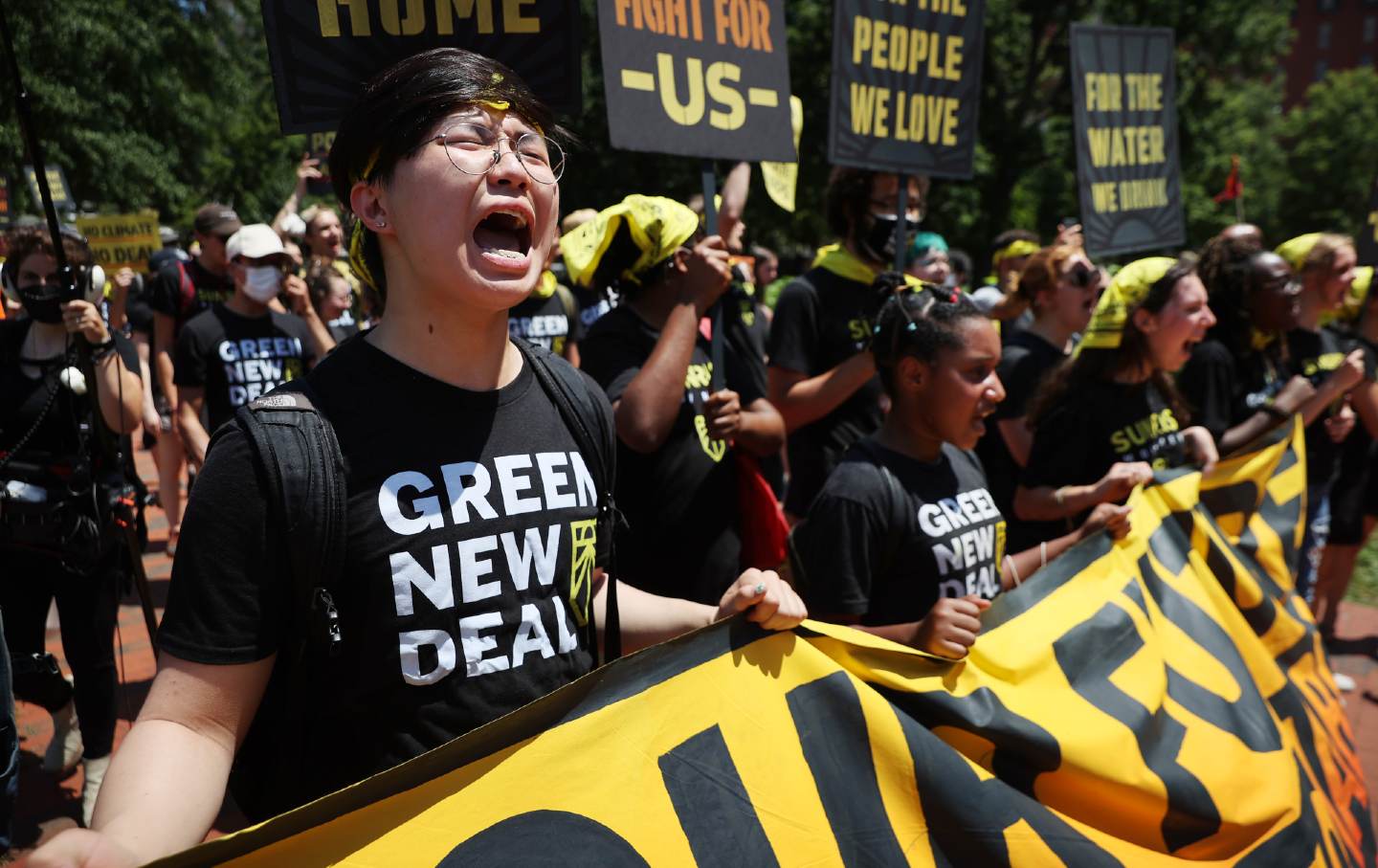
The Green New Deal—From Below The Green New Deal—From Below
It’s a base for countering Trump’s destructive policies.
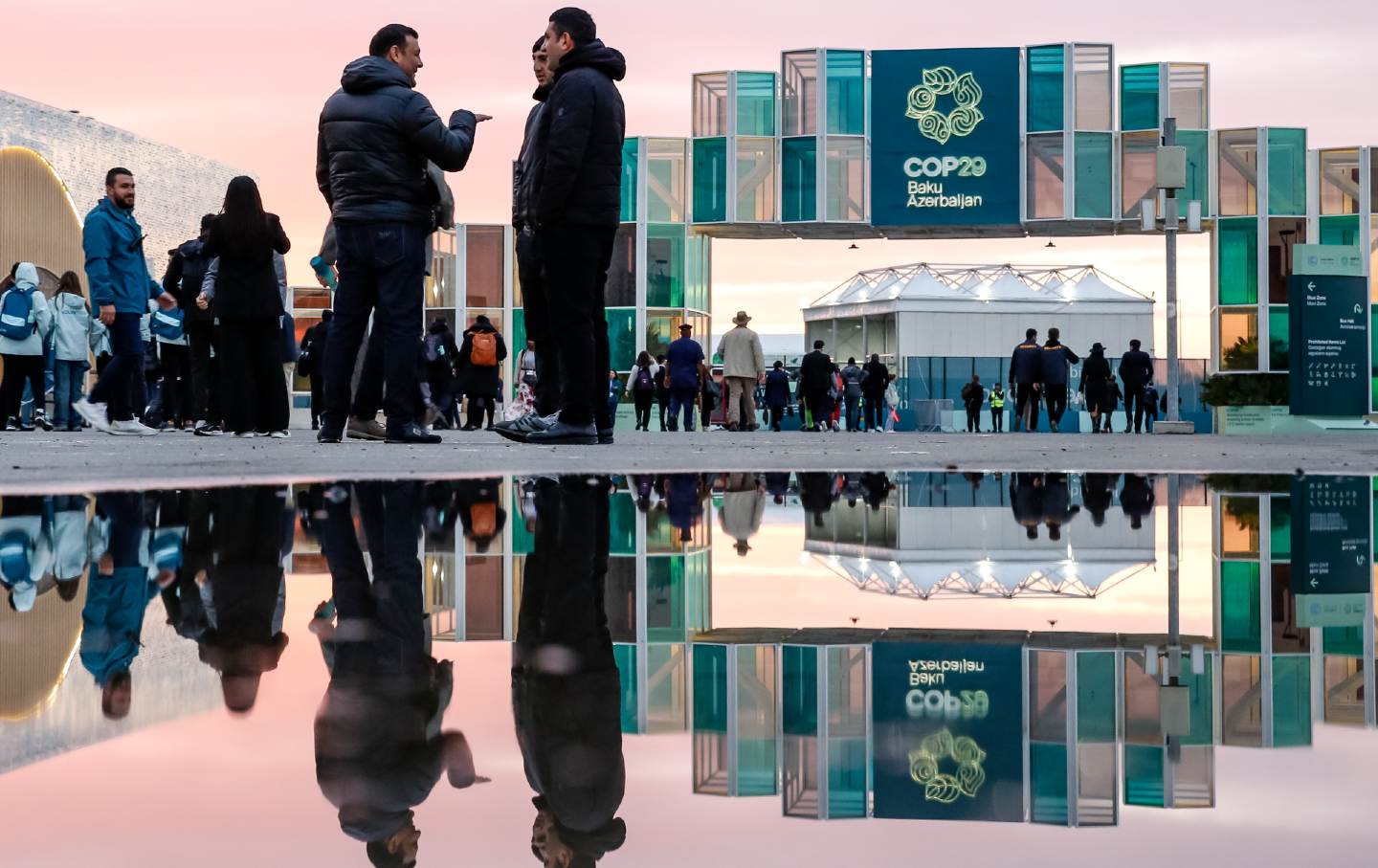
The “Dark Joke” of Having a Climate Summit in Azerbaijan The “Dark Joke” of Having a Climate Summit in Azerbaijan
COP29 in Baku reveals the contradictions of having climate negotiations in a petro-state.
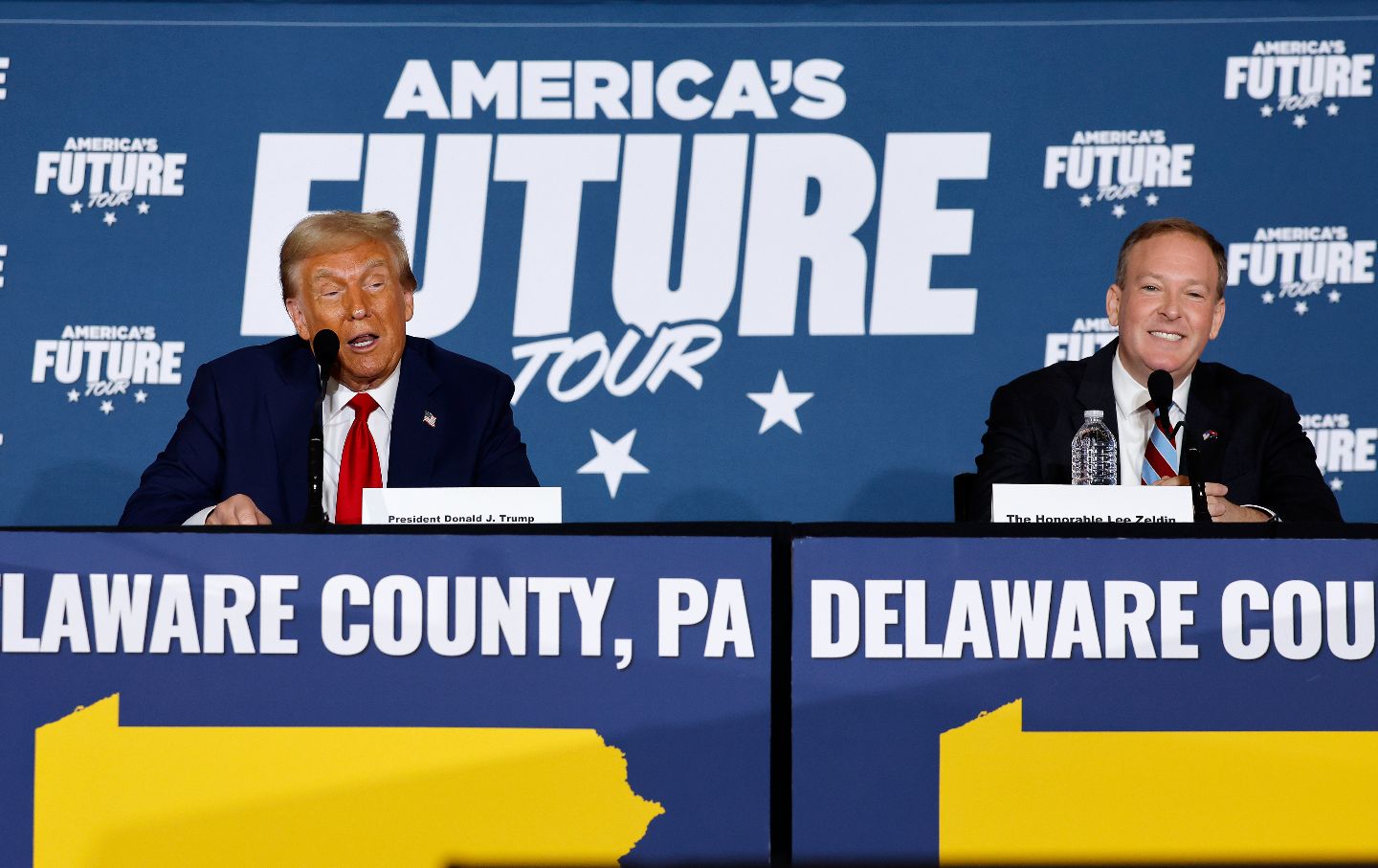
Why Trump Picked Lee Zeldin to Lead the Environmental Protection Agency Why Trump Picked Lee Zeldin to Lead the Environmental Protection Agency
With a Republican majority in Congress and Zeldin promising to “deregulate” the EPA, the new Trump administration will prioritize fossil fuel interests over environmental protecti...
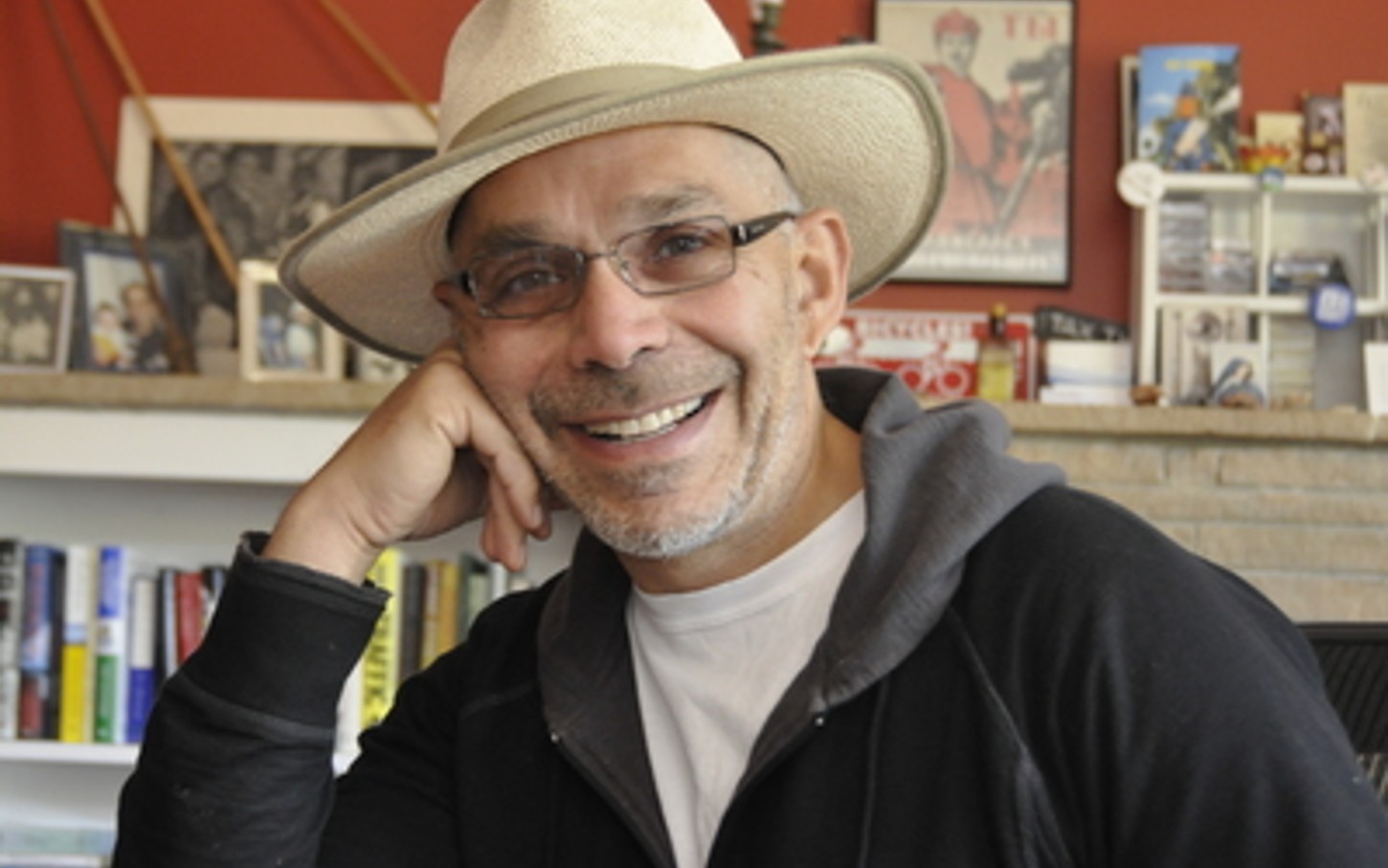
Climate Realism (Still) Means Climate Justice Climate Realism (Still) Means Climate Justice
An interview with Tom Athanasiou on where climate geopolitics goes from here, and why unlocking trillions in climate finance is an “existential necessity.”
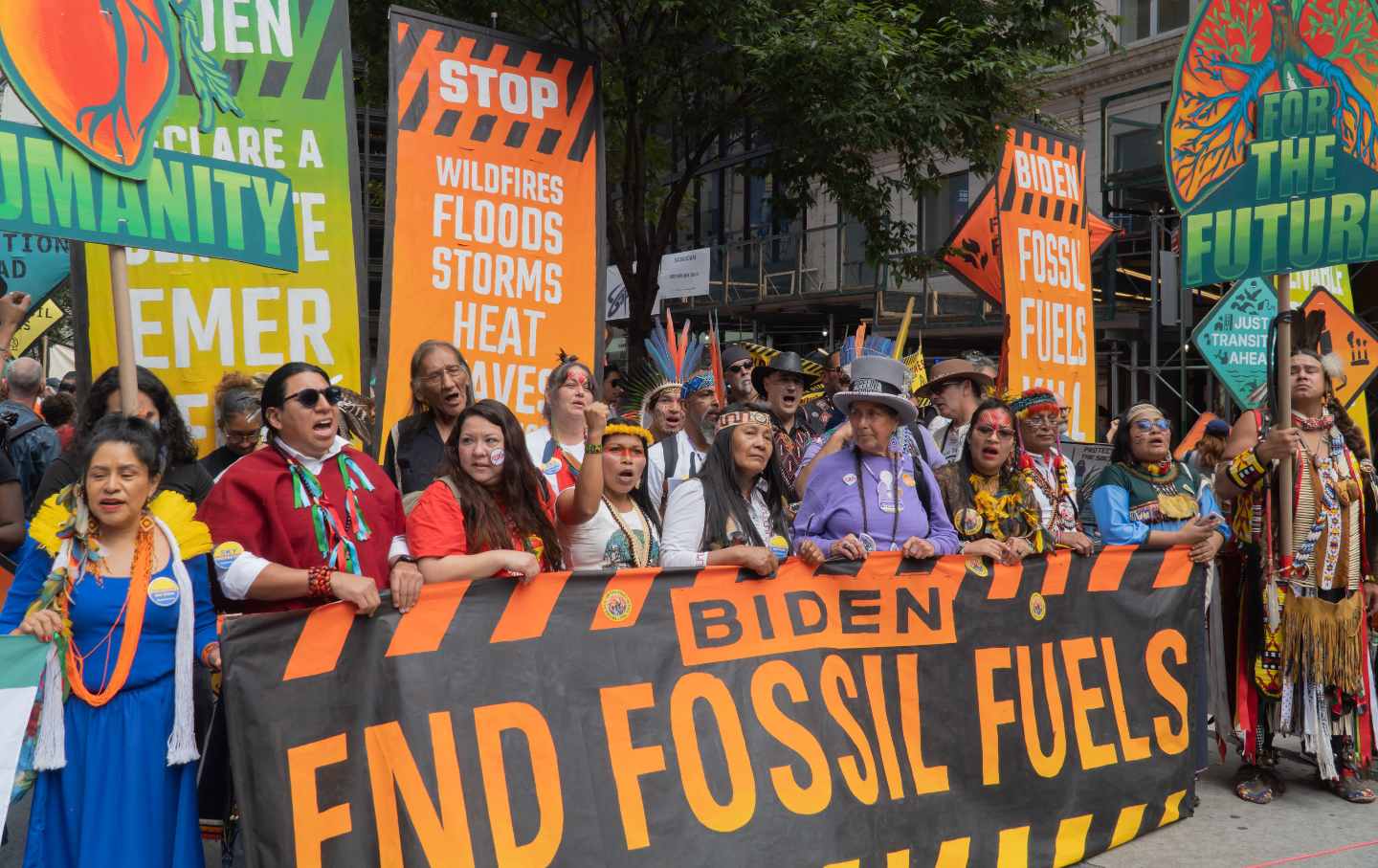
Anti-Protest Laws Won’t Silence Climate Activists Anti-Protest Laws Won’t Silence Climate Activists
Still, punitive measures against climate protest are reaching new extremes.
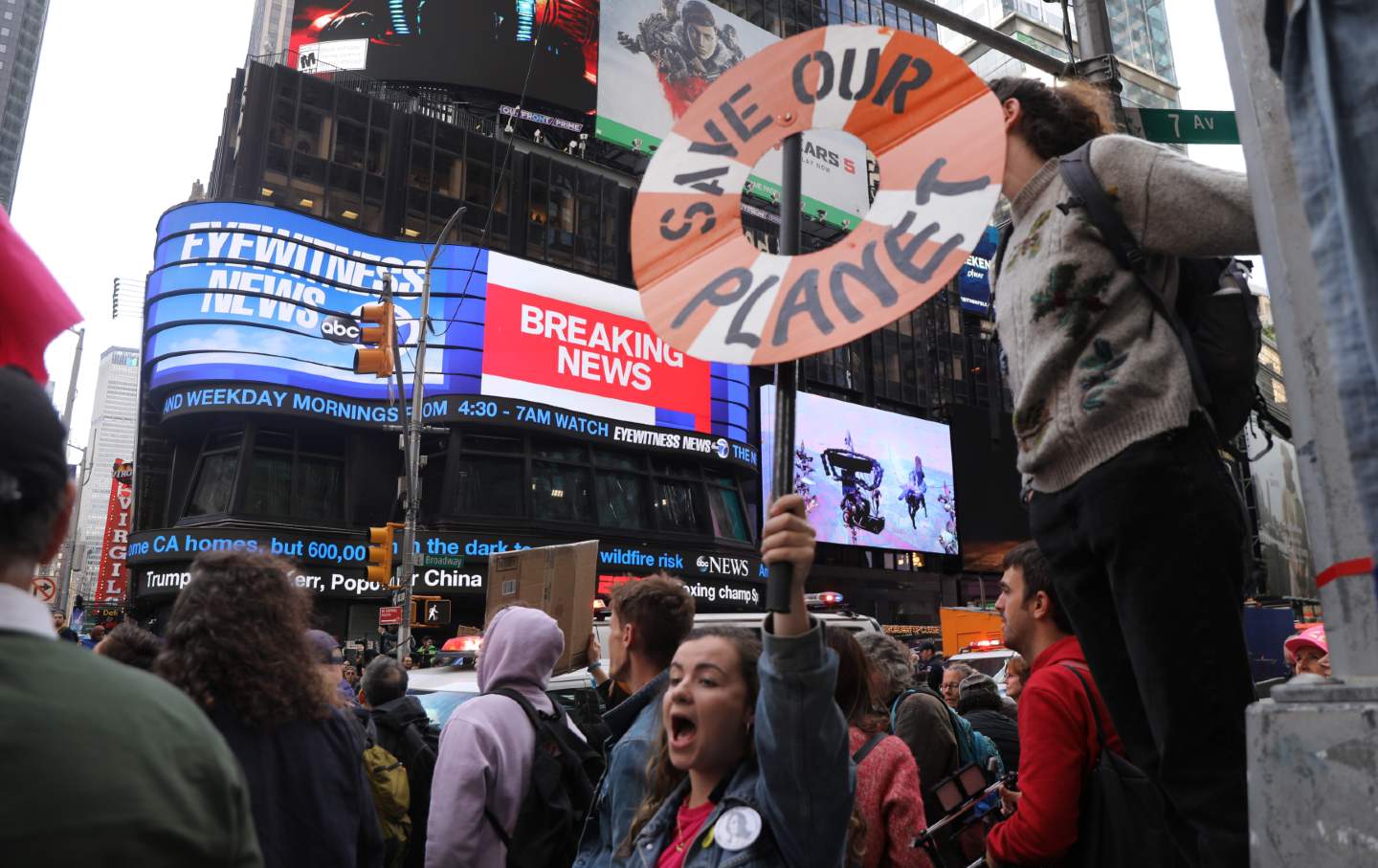
Journalists Must Rethink Our Fear of Taking Sides Journalists Must Rethink Our Fear of Taking Sides
The media often acts as if identifying threats or naming falsehoods are acts of partisanship. They are not. They are journalism.


